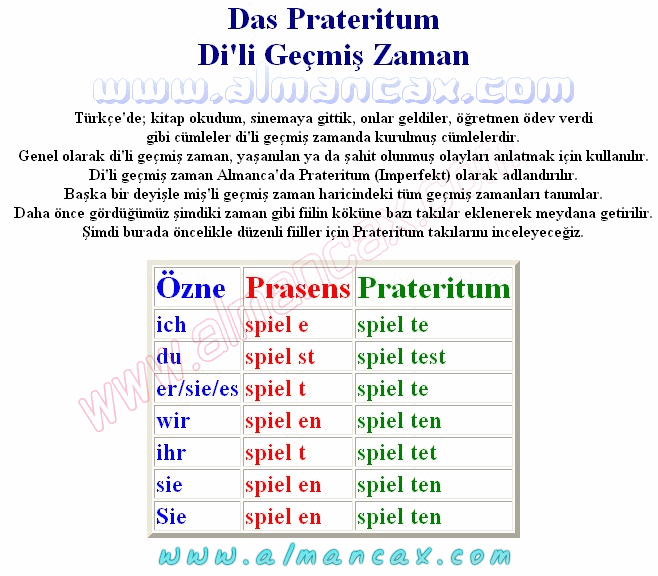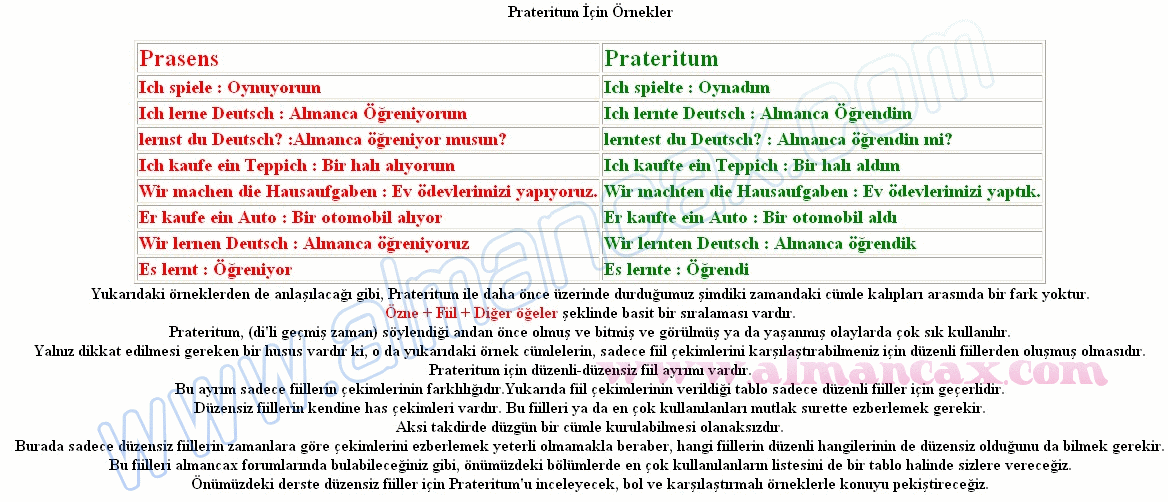> Forums > German Times and Conventions > Lesson 13: Prateritum (Past Tense with D) – 1 Regular Verbs
-
Hello, hocam.gecmis, didn't we do it using the verbs haben and sein? As in ich habe ein Auto gekauft sample sentence, I saw it for the first time as you described it, rather I learned as in the example. I am waiting for your help.
Thank you sir, your hands are very nice. I am looking forward to the continuation of this topic. Thank you again. Best regards…
We did not make use of the acts of the haben and sein. ich habe ein Auto gekauft Just like in the sample test, I saw for the first time on the heels you told me, but I learned just like I did. I look forward to your help.
what you say is perfekt.
There are two past tenses: Perfekt and Präteritum. We use Perfekt in speaking language and Präteritum in written language.
zB -> Ich habe mich auf deinen Brief gefreut. = Glad your letter.
Früher machte ich Sport in der Schule. = I used to do sports at school.In addition, Plusquamperfekt is used in the subordinate sentences created with 'nachdem'. Apart from that, Plusquamperfekt does not have to be used. It is the 'Story of Past Time' in Turkish.
zB -> Nachdem ich gefrühstück hatte, habe ich geduscht.
oder, Ich habe geduscht, nachdem ich gefrühstück hatte. `= I took a shower after I had breakfast.Ich hoffe, dass ich euch bei euren Problemen helfen konnte.
I hope I can help you with this.Also thank you for your help.
Thank you teacher, health to your labor .. I think it is better to learn this subject in prca part .. I tried to learn it in bulk before, but I had it in my hand :) If this happens, it would be more understandable, I think we will have difficulties;) thank you again
Kind regards….Greetings! First of all, I wish you success in your work. However, I find it somewhat odd that the time Imperfekt (Präteritum) is interpreted in Turkish as a past time with -di. So what is the Turkish equivalent of Perfekt time?
Best regardsHello,
Prateritum also tells the past time, like perfekt, but there are minor differences between them. Sometimes they are used instead of each other and sometimes it is not possible to use them.
“Gestern regnete es.” instead “Gestern hat es geregnet” It means the same thing…
“Ich wollte was sagen.” ...I was going to say something
instead
“Ich habe was sagen wollen.” as well.It can generally be translated into Turkish as "the story of the present or present tense". Come-i-dum or Come-du-ium I shaped…
However, this type of translation is not always the individual one.
Präteritum is used especially in written language, modalverbs, conjunctiv II and some idioms.
He tells us the indirect past time at the tables. There was one, one was lost, etc. (Spouse war einmal.)LG
Derwisch
Morgen früch stand ich auf, wusch mir meine Hände und mein Gesicht, machte Früchstück, dann stand in den Bus auf, ging in die Schule, nahm Physik und Chemiestunden, mit dieser hatte eine Prüfung. Danach kehrte ich nach Hause zurück, war um 15. Uhr zu Hause, machte Hausaufgabe, brachte meine Tasche in Ordnung. Um 21.Uhr schlief ich. Tschüs…
LG
DerwischGreetings! First of all, I wish you success in your work. However, I find it somewhat odd that the time Imperfekt (Präteritum) is interpreted in Turkish as a past time with -di. So what is the Turkish equivalent of Perfekt time?
Best regardsImperfekt gibt es nicht im Deutschen. Es gibt nur imperfektive und perfektive Verben, aus diesem Grunde ist die Terminologie vor vielen Jahren geändert worden. Präteritum heißt nur
das Vergangene
ohne jegliche weitere Nuance.Insofern passt diese Bezeichnung zur türkischen Vergangenheit auf -di sehr gut.
I am writing in German. I am preparing for spracha. I will speak your memorize. You will write rtl or something.
very good and clear things
Well friends, I see German at my school, but now I'm confused as our teacher said, olck -di li past tense or ich habe gein like Auto gekauft I'm waiting for your answers
I understood that my mind was obsessed with the seysu;
for example: …ich habe gespielt… with the sentence …ich spielte…. What is the difference between the summation?
there is a difference in meaning, in which case the first instance and in what case the second instance can be used in the cum ..Thank you..
Dear cixi_54; The sentence “Ich habe gespielt” describes the event that ended in the present tense. "I played." It has no other meaning.
The sentence “Ich spielte” is 1. “I played.”
2. “I was playing.”
3. “I used to play.” It has meanings like:
Präteritum does not have an exact equivalent in Turkish.
Perfekt is used in spoken language and Präteritum in written language.Ask if there is any other problem. Greetings, it succeeds.
danke schön
- To reply to this topic You must be logged in.

